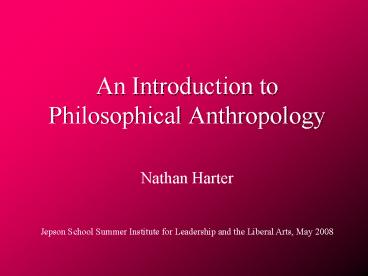An Introduction to Philosophical Anthropology - PowerPoint PPT Presentation
1 / 40
Title:
An Introduction to Philosophical Anthropology
Description:
... information and claim that there is nothing more is known as reductionism ... Avoid reductionism. 38. For comment, please e-mail nharter_at_purdue.edu. 39 ... – PowerPoint PPT presentation
Number of Views:1252
Avg rating:3.0/5.0
Title: An Introduction to Philosophical Anthropology
1
An Introduction to Philosophical Anthropology
- Nathan Harter
Jepson School Summer Institute for Leadership and
the Liberal Arts, May 2008
2
- Notes toward a book chapter
3
Those questions animating us in Leadership
Studies often depend on the answer to prior
questions we rarely think to ask.
- Among those prior questions is the following
- What does it mean to be human?
4
Conceptual Frameworks
- We all study, teach, and practice leadership from
within certain conceptual frameworks. Not all of
them are conscious. Not all of them are clear,
coherent, or consistent with other beliefs we
accept as true. Isaiah Berlin promised that
philosophy would unearth and critique these
conceptual frameworks.
5
Sciences do treat the question
- Some such as biology are too broad
- Some such as economics are too narrow
- But philosophy did not, like Goldilocks, seek an
intermediate science - Rather philosophical anthropology seeks to
assemble and possibly integrate all findings - To reflect the full amplitude of our being
6
Science must exclude some phenomena in order to
examine other phenomena
- Yet to rely on only some of the available
information and claim that there is nothing more
is known as reductionism
7
Is there an grand unified theory?
- Or should we adopt what William James referred to
as a pluralistic mindset?
8
Critics already exist
- They argue that the literature excludes relevant
information - Certain types of people (e.g. women)
- Certain aspects of people (e.g. spirituality)
- Certain social contexts (e.g. organizational
culture) - Certain pursuits (e.g. business)
9
How we treat each other depends on how we regard
each other. (Trigg, 1999)
10
- Three two-dimensional frameworks
11
One Way to Organize the FieldA Static Model
12
(No Transcript)
13
(No Transcript)
14
(No Transcript)
15
(No Transcript)
16
(No Transcript)
17
(No Transcript)
18
(No Transcript)
19
(No Transcript)
20
(No Transcript)
21
(No Transcript)
22
(No Transcript)
23
(No Transcript)
24
(No Transcript)
25
(No Transcript)
26
(No Transcript)
27
(No Transcript)
28
(No Transcript)
29
(No Transcript)
30
Another Way to ClassifyDynamic Models
31
- The schema is not itself a dynamic model.
- It classifies dynamic models.
32
(No Transcript)
33
Dialectics
34
Democracy (e.g. Dewey)
35
Yet Another Way to ClassifyModels of the Human
Ideal
36
We have unique callings, though none is
called to lead
37
Christianity
38
Frameworks for Conceptual Frameworks
- Make these frameworks explicit
- In ones classroom
- In ones writings
- In actual practice
- Classify these frameworks
- Critique them
- Conform to lived experience?
- Internally coherent?
- Consistent with other beliefs?
- Avoid reductionism
39
- For comment, please e-mail nharter_at_purdue.edu
40
Aristotle. (1973). The politics of Aristotle (E.
Barker, trans.). Oxford Oxford University Press.
(Original work published 1946)Berlin, I. (2000).
The power of ideas. Princeton, NJ Princeton
University Press.Buber, M. (1965). Between man
and man (R.G. Smith, trans.). New York
Macmillan.Cassirer, E. (1944). An essay on Man.
New Haven Yale University Press.Cassirer, E.,
Kristeller, P., J. Randall, Jr. (eds.). (1948).
The Renaissance philosophy of Man. Chicago
University of Chicago Press.Cawthon, D. (2002).
Philosophical foundations of leadership. New
Brunswick Transaction Publishers.Cooper, B.
(1999). Eric Voegelin and the foundations of
modern political science. Columbus, MO
University of Missouri Press.Gray, J. (2002).
Straw dogs. London Granta Books.Harvey, M.
Leadership and the human condition. In
Goethals, G. G. Sorenson, (eds.). (2006). The
quest for a general theory of leadership (chap.
2). Northampton, UK Edward Elgar.James, W.
(1996). A pluralistic universe. Lincoln
University of Nebraska Press. (Original work
published 1909)Joas, H. (1996). The creativity
of action (J. Gaines P. Keast, trans.).
Chicago University of Chicago Press. (Original
work published 1992)Kim, C. (1998, August
10-15). The nature and possibility of
philosophical anthropology. Twentieth World
Congress of Philosophy. lthttp//www.bu.edu/wcp/Pap
ers/Anth/AnthKim.htmgt.Landmann, M. (1974).
Philosophical anthropology (D. Parent, trans.).
Philadelphia Westminster Press. (Original work
published 1969)Malik. K. (2000). Man, beast,
zombie. New Brunswick, NJ Rutgers University
Press.Mazlish, B. (1990). The leader, the led,
and the psyche (chap. 16). Hanover Wesleyan
University Press.Pappé, H.O. Philosophical
anthropology. In P. Edwards (ed.). (1967). The
encyclopedia of philosophy (vol. 6 pp. 159-166).
New York MacMillan the Free Press.
Philosophical anthropology. (2007). In
Encyclopedia Britannica. Retrieved 6 April 2007,
from Encyclopedia Britannica Online
http//www.britannica.com/eb/article-15051.Schele
r, M. (1958). Philosophical perspectives (O.
Haac, trans.). Boston Beacon Press.Scheler, M.
(1961). Mans place in nature (H. Meyerhoff,
trans.). New York Noonday Press. (Original work
published 1928)Schmitz, K. (1993). At the center
of the human drama. Washington D.C. The Catholic
University of America Press.Stevenson, L.
(1987). Seven theories of human nature (2nd ed.).
New York Oxford University Press.Trigg, R.
(1999). Ideas of human nature An historical
introduction (2nd ed.). Malden, MA
Blackwell.Van de Ven, A. M. Poole. (1995).
Explaining development and change in
organizations. Academy of Management Review
203510-540.Wilber, K. (2000). Sex, ecology,
spirituality (revised ed.). Boston Shambhala.
Selected References































